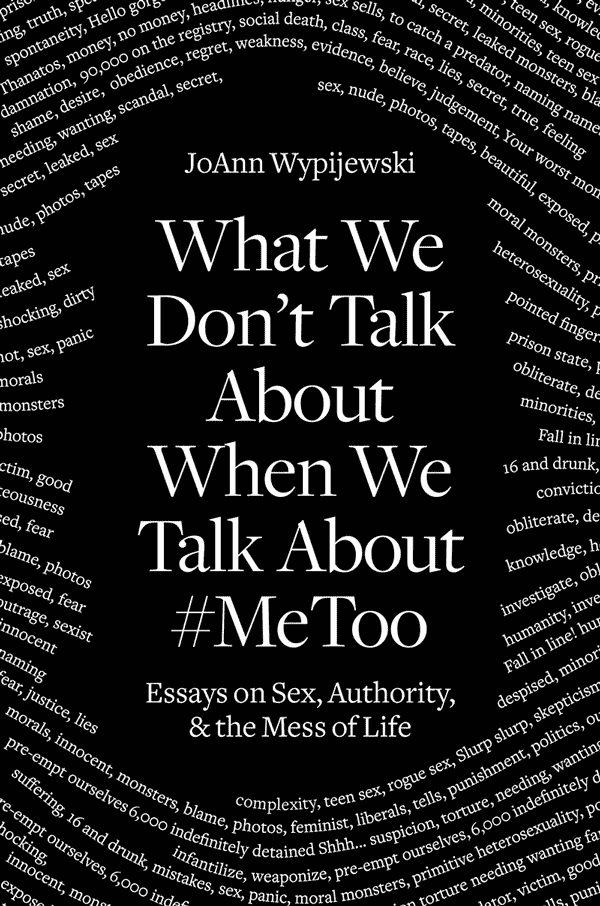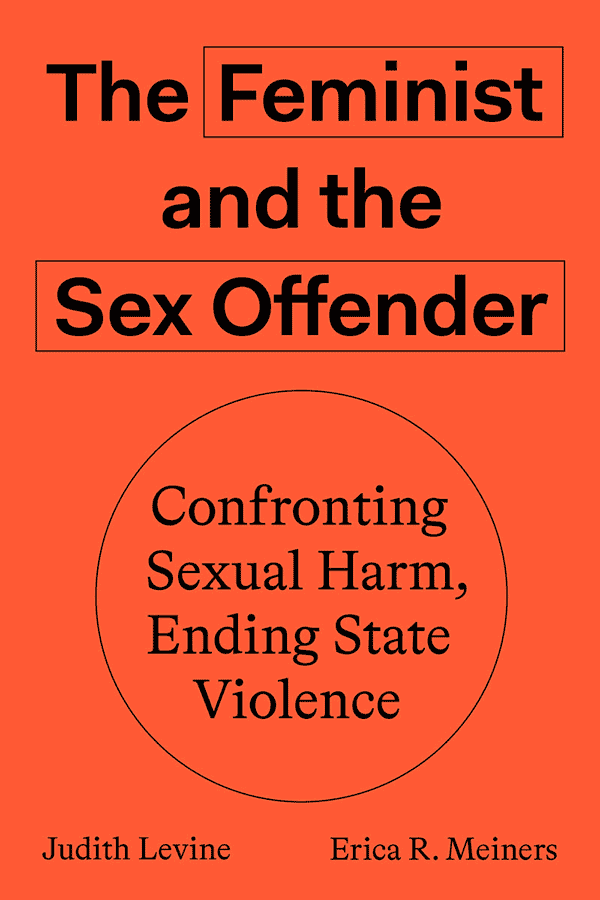In this exhausting era of polarized politics and the vengeful moralists who seek not only to bring down the other guy but also the guy on their side who dares to deviate one centimeter from the correct position — theirs — I am happy to report the publication of two books that will restore your faith in rationality: JoAnn Wypijewski’s What We Don’t Talk About When We Talk About #MeToo: Essays on Sex, Authority, and the Mess of Life; and Judith Levine and Erica R. Meiners’s The Feminist and the Sex Offender: Confronting Sexual Harm, Ending State Violence (both from Verso).
The authors blow up the predictable, comforting categories of our side/their side, left/right, progressive/reactionary, and take us on an illuminating journey into complexity, ambiguity, and uncertainty. Over and over, they show why the ends do not justify the means, not when the means require the sacrifice of innocent lives on the altar of moral purity, not when the means require inflexible obedience to dogma, and most certainly not when those means worsen the problem they are meant to solve. As feminists, they separate what’s right in the pursuit of justice from what’s self-righteous. As skeptics, they repudiate received wisdom and party loyalty, showing that by separating what we wish for from wishful thinking, we can find better, more creative, more flexible routes to attaining the former.
Wypijewski’s What We Don’t Talk About When We Talk About #MeToo consists of 16 deep dives into events we thought we understood, revealing “the mess of life” in all its glorious refusal to be squeezed into convenient boxes. A tireless investigative journalist, Wypijewski travels to cities, small towns, and courtrooms to give us the full stories that “exist in the region of raw emotion, the region of danger and fury. Here be demons.” And quite an assortment of demons it is. Her list includes Father Paul Shanley, who was unjustly imprisoned during the priest sex scandals; drunken college students expelled or incarcerated after #MeToo allegations; the murderers of Matthew Shepard (the gay college student whose killing became the prototypical homophobic hate crime), Nushawn Williams (a 21-year-old HIV-positive small-time drug dealer who was accused of deliberately infecting the young women he’d had sex with), former South Carolina governor Mark Sanford, who dared have a “scandalous” affair that riled supporters as well as detractors, and, of course, Woody Allen.
The pursuers of these demons, Wypijewski writes, “may be on the political right, but often they are liberals or professed progressives. The demon may be guilty or not; the crime, grievous, nonexistent or anywhere on a scale of harm. Rage unites them. Bombast is the conventional linguistic mood. Falling in line is the objective.” Enemies vary: rich, poor, immigrants, white males, black males, and teenagers who behave like stupid, drunken, bullying, sexual…teenagers. Whoever their target, the mob revels in the excitement of scandal and retribution, which has become “ordinary, terrible fun. Mercy is the scandal now.”
If a sex panic is bad when evangelicals start one, Wypijewski argues, it is equally bad when feminists do. This position does not make her anti-feminist any more than criticizing Donald Trump makes me anti-American (though he would say it does). The right’s call to “Save our children” is echoed in the left’s call to “Believe the children,” and the sex panics that erupted from those simplistic mantras have added thousands more to our already highest-in-the-world incarceration rate. “Liberals and feminists stirred many of these panics and have deployed an inflammatory language that they would mock were it coming from the right,” she writes. A sex panic may be set off by genuine claims, as in the case of priest scandal and the prevalence of rape and sexual harassment, but by its very nature it quickly runs amok, fueled by exaggerated statistics and a blurring of distinctions: “In the cauldron of panic, definitions collapse,” she writes. “Abuse might be a comment, a caress, a violent act.” Anyone who makes those distinctions, let alone who demands skepticism and evidence before assuming that an accused is guilty, is in denial, a traitor to the cause.
Vengeance, once lamented as irrational madness, whether by individuals or groups, has become a social good. Today’s pompous posses claim to be acting on behalf of “justice,” but justice only for some people — those we like, those like us. Wypijewski calls out Teen Vogue columnist Emily Lindin for tweeting that she didn’t care if “some innocent men’s reputations have to take a hit in undoing the patriarchy… that is a price I am absolutely willing to pay.” Oh, really? “A curious way of putting it,” says Wypijewski, “since Lindin would absolutely not be the one to pay.” In each of her essays, Wypijewski asks questions the press and public rarely asked, and she offers more nuanced answers:
- In lamenting the terrible death of Matthew Shepard, why did observers ignore other factors that may have been involved? His murderers were, everyone agreed, homophobic but in an “ordinary way.” Wypijewski went to Laramie to find out what in their world of trailer parks, drugs, violence, and masculine insecurity converged to end in murder. The killers weren’t “monsters,” she shows; they were “far more devastatingly human than is comfortable to consider.”
- In raging over Nushawn Williams, an infuriated public, newly frightened by HIV/AIDs, wanted to throw the book at him. Wypijewski went to Jamestown to understand his life, the girls, the intricacies of what happened, and set the story in the larger context of the town and the times. Was he a selfish bastard? Were his partners “slutty, stupid women”? Not so simple.
- In fulminating against Mark Sanford for having an affair, were his liberal accusers right in tossing him into the crowded bin of political and religious hypocrites? Sanford wasn’t a Bible thumper, he didn’t sign a bill to require “I BELIEVE” on the state license plate, and hadn’t won the governorship by pushing family values. His “liberal scolds” got it all wrong, Wypijewski writes. “They profess to be cosmopolitan, above religious mumbojumbo, vanguardists for self-determination…all the while arguing the case for compulsory monogamy and just punishment for sexual sin more vigorously than the religionists they laugh at.” Sanford and his wife eventually divorced, and, as of 2019, he was still with his lover.
- In their haste to condemn Woody Allen, why did so many fail to condemn Mia Farrow, who used her daughter as a weapon, or the prosecutor who dropped the case for lack of evidence but improperly convicted Allen by press release?
Across these essays, Wypijewski shows us repeatedly that “desire is a trickster.” Lust, longing, love, need, solace, insecurity, and ambivalence are death to simplistic judgments of other people’s sexual relationships (let alone our own). Even as she excoriates “right wing lunacy” — opposition to sex education, condoms (or any other contraceptive), sexual pleasure, and the relentless effort to scare young people into abstinence — she also comes down hard on the left wing fantasy “that kids can be protected from bad sex, mediocre sex, regret, risk, danger, pain. And they can’t, any more than adults can. In matters of the heart, intimacy means vulnerability means daring to bet against pain. As with all bets, sometimes, often, you lose.”
What, then, is to be done about the ongoing problems ranging from sexual violence to drunken coercion to plain bad behavior? What punishment fits the crimes — moral or criminal — of teenage boys and adult men who treat girls and women in despicably callous ways? What’s the alternative to “lock ‘em up”? In The Feminist and the Sex Offender, Levine and Meiners acknowledge just how gratifying it feels when the bad guys are caught — as when Harvey Weinstein was brought down, when Larry Nassar was sentenced to 175 years in prison. “It was hard not to feel a sense of rightness, of payback,” they write. “And yet, payback also felt unsatisfying — indeed, wrong.” The reason, they argue, is that vengeance and punishment do not solve anything. They do not reduce sexual and gender violence. They don’t teach anybody anything. They harden hearts against the entreaties of empathy. As one of my favorite Buddhist aphorisms says, “Vengeance is like drinking poison and hoping the other person will die.”
The Feminist and the Sex Offender is an indictment of the “ever-expanding body of laws and practices designed to punish and ‘manage’ people with sex-related convictions.” These include draconian prison sentences; civil commitment; indefinite detention and monitoring following release from prison; and the sex offender registry, mandated for everyone from serial rapists to teenage boys caught masturbating to young men who have consensual sex with a partner technically below the legal age. The registry also has caught in its net the thousands of young men who are never convicted of anything, but take a plea rather than risk trial. “This regime does no good and much harm,” Levine and Meiners write. “It does not protect children or anyone else.”
But these laws, which bolster “the ineffective, racist, and profoundly destructive prison industrial complex,” have been supported by both parties, by school administrators and community activists — and by feminists. Not all feminists, however. A bright clear line has divided feminists for centuries on the best means to shared ends, and still does. Levine and Meiners show how the contingent now called “carceral” feminists (from the same root as incarcerate), spurred by rage and an eagerness for retribution — and by the exhilaration of “at last we’re getting the bastards” — has played a large role in expanding the prison industrial complex, along with that cruel sex offender registry, precisely at the time that other feminists and civil rights activists are trying to rein it in.
Everyone agrees on the goals — reducing sexual violence, holding perpetrators of harm accountable, helping victims recover. But what does accountability look like? Equating accountability with retribution, say Levine and Meiners, won’t get us anywhere near those goals. Their own vision, along with Wypijewski’s, grows out of the movement for restorative justice, which seeks repair rather than revenge. Their book investigates the efforts being made to bring this admittedly “utopian” approach to fruition — an approach that “centers the needs of the harmed person yet never loses sight of the harm-doer’s humanity, or the harm that may have befallen him.”
What? Those demons are human? Stop outsourcing justice to the mob? Seek solutions that work rather than make us momentarily feel righteous? No wonder skepticism is so damned hard, but these books light the path. ![]()
About the Author
Dr. Carol Tavris is a social psychologist and coauthor, with Elliot Aronson, of Mistakes Were Made (but Not by Me): Why We Justify Foolish Beliefs, Bad Decisions, and Hurtful Acts. Watch the recording of Science Salon # 10 in which Tavris, in a dialogue with Michael Shermer, explores cognitive dissonance and what happens when we make mistakes, cling to outdated attitudes, or mistreat other people. Read I, Too, Am Thinking About Me, Too in which Tavris reminds us that it is more important than ever to tolerate complexity and ask questions that evoke cognitive dissonance whenever a movement is fueled by rage and revenge. Read Please Touch in which Tavris reminds us that the human need for touch is significant.
This article was published on June 2, 2020.

















“What punishment fits the crimes — moral or criminal — of teenage boys and adult men who treat girls and women in despicably callous ways? ”
Thanks for the gendered denigration of men and boys, but not women and girls who, we must assume, never treat the opposite sex “in despicably callous ways.” And this in an article that supposedly goes to bat for calm, nuanced analysis of sex and relations between the sexes. Why am I not surprised?